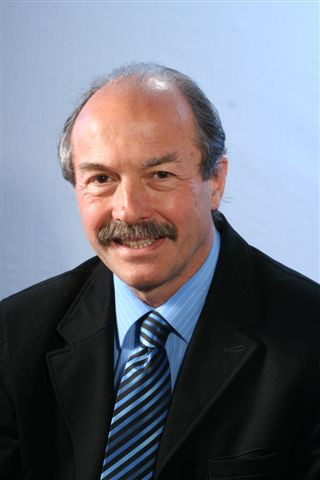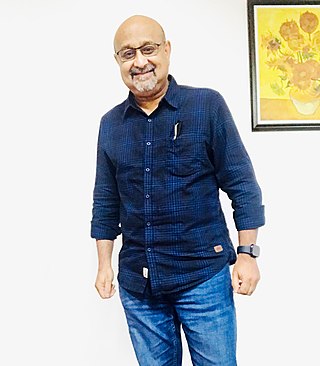Related Research Articles
Nimotuzumab is a humanized monoclonal antibody that as of 2014 had orphan status in the US and EU for glioma, and marketing approval in India, China, and other countries for squamous cell carcinomas of the head and neck, and was undergoing several clinical trials.
Denise Sheer was appointed professor of human genetics at The Institute of Cell and Molecular Science at Queen Mary, University of London in November 2006. Her fields of expertise include cell and molecular biology; cancer genetics and epigenetics; and molecular pathology of paediatric brain tumours.
Masayoshi Yamaguchi is a distinguished biomedical scientist and researcher. He is notable for discovering the novel protein and genes named Regucalcin and RGPR-p117, respectively.
Wafik El-Deiry is an American physician and cancer researcher who is the Associate Dean for Oncologic Sciences at the Warren Alpert Medical School, Brown University, Director of the Cancer Center at Brown University, and the Director of the Joint Program in Cancer Biology at Brown University and its affiliated hospitals. He was previously deputy director of Translational Research at Fox Chase Cancer Center, where he was also co-Leader of the Molecular Therapeutics Program.
Trey Ideker is a professor of medicine and bioengineering at UC San Diego. He is the Director of the National Resource for Network Biology, the San Diego Center for Systems Biology, and the Cancer Cell Map Initiative. He uses genome-scale measurements to construct network models of cellular processes and disease.

Brigatinib, sold under the brand name Alunbrig among others, is a small-molecule targeted cancer therapy being developed by Ariad Pharmaceuticals, Inc. Brigatinib acts as both an anaplastic lymphoma kinase (ALK) and epidermal growth factor receptor (EGFR) inhibitor.

Michael R. Hayden, is a Killam Professor of Medical Genetics at the University of British Columbia, the highest honour UBC can confer on any faculty member. Only four such awards have ever been conferred in the Faculty of Medicine. Dr. Hayden is also Canada Research Chair in Human Genetics and Molecular Medicine. Hayden is best known for his research in Huntington disease (HD).
William Douglas Figg is an American scientist (pharmacologist). He is a senior investigator (tenured) at the National Cancer Institute (NCI), National Institutes of Health (NIH), Bethesda, Maryland. He holds multiple titles within the NCI: Associate Director of the Center for Cancer Research, Co-Director of the Office of Translational Resources, Acting Branch Chief for the Genitourinary Malignancies Branch, Chief of the Clinical Pharmacology Program, and head of the Molecular Pharmacology Section. Figg is also the Co-chief of Basic Research at the Center for Prostate Disease Research within the Walter Reed National Military Medical Center – Murtha Cancer Center in Bethesda, Maryland.

György Kéri was a Hungarian biochemist, professor and Doctor of Biological Sciences (D.Sc.). His major field of research was signal transduction therapy and he participated in the development of novel drug discovery technologies and drug candidates that entered the clinical development process.

Don W. Cleveland is an American cancer biologist and neurobiologist.
Sandip Basu is an Indian physician of Nuclear Medicine and the Head, Nuclear Medicine Academic Program at the Radiation Medicine Centre. He is also the Dean-Academic (Health-Sciences), BARC at Homi Bhabha National Institute and is known for his services and research in Nuclear Medicine, particularly on Positron emission tomography diagnostics and Targeted Radionuclide Therapy in Cancer. The Council of Scientific and Industrial Research, the apex agency of the Government of India for scientific research, awarded him the Shanti Swarup Bhatnagar Prize for Science and Technology, one of the highest Indian science awards for his contributions to Nuclear Medicine in 2012.
Kochupurackal P. Mohanakumar is an Indian chemical biologist, neuroscientist and the director of Inter University Centre for Biomedical Research and Super Specialty Hospital, Kottayam. He is a former chief scientist at the Indian Institute of Chemical Biology and is known for his studies on Parkinson's disease and Huntington's disease. The Department of Biotechnology of the Government of India awarded him the National Bioscience Award for Career Development, one of the highest Indian science awards, for his contributions to biosciences in 2000.

Madhavan Radhakrishna Pillai is an Indian cancer biologist and the former director of the Rajiv Gandhi Centre for Biotechnology. Known for his studies on papilloma viruses, Pillai is an elected fellow of the Indian Academy of Sciences, National Academy of Sciences, India, Royal College of Pathologists and the National Academy of Medical Sciences. The Department of Biotechnology of the Government of India awarded him the National Bioscience Award for Career Development, one of the highest Indian science awards, for his contributions to biosciences in 2002.

Muhammad Imran Qadir, also known as M. I. Qadir, is a Pakistani pharmaceutical scientist.
Peter Edward Fecci is an American neurosurgeon, professor and researcher. He is an Associate Professor of Neurosurgery, Pathology and Immunology at Duke University School of Medicine. He also serves as Director of the Duke Center for Brain and Spine Metastasis, Director of the Brain Tumor Immunotherapy Program, Residency Program Director, and Associate Deputy Director of the Preston Robert Tisch Brain Tumor Center at Duke.
Christopher Kevin Glass is an American biophysicist, holding the titles of Distinguished Professor of Cellular and Molecular Medicine and Distinguished Professor of Medicine at the University of California, San Diego He works on the molecular mechanisms that control macrophage functions in health and disease.
Scott A. Waldman is an MD and biomedical scientist at Sidney Kimmel Medical College of Thomas Jefferson University, where he is the Samuel M.V. Hamilton Professor of Medicine, and also tenured professor and chair of the Department of Pharmacology & Experimental Therapeutics. He is author of a pharmacology textbook, and former chief editor of Clinical Pharmacology & Therapeutics. He is known for his work in atrial natriuretic factor intracellular signaling through guanylate cyclase (GC), and the relation of Guanylyl cyclase C (GC-C) to the pathogenesis of colorectal cancer. Also for his hypotheses concerning the roles of intestinal paracrine hormones in satiety, obesity and cancer risk. Waldman also holds a concurrent position as adjunct professor at the University of Delaware, School of Health Sciences.

Alberto Bardelli is an Italian geneticist and cancer researcher, expert in the field of precision medicine. He is a full professor of histology at the Department of Oncology, University of Turin and Scientific Director of IFOM, the AIRC Institute of Molecular Oncology.
John A. Hickman is a British-French cancer pharmacologist.

Christoph Merten is a German bio-engineer and entrepreneur; currently professor at EPFL. He is an adjunct scientist at the Ludwig Institute for Cancer Research in Lausanne. His research focuses on developing biomedical microfluidics technologies for drug discovery, diagnostics, and personalized therapy in cancer research.
References
- ↑ "Investment From The Huntington Society Of Canada And Brain Canada Could Make Gene-Silencing Even More Effective". Huntington Society. Archived from the original on 2019-07-06.
- ↑ "Seeing is Believing: Molecular Imaging Aids Canadian Biopharmaceutical Sector" (PDF). Pharmaceutical Canada. 9: 14.
- ↑ "Abedelnasser Abulrob -- Official departmental web page". University of Ottawa. Archived from the original on 2017-07-03.
- ↑ "Google Scholar". Google Scholar. Archived from the original on 2021-02-04.
- 1 2 3 "University of Ottawa Brain and Mind Institute". University of Ottawa. Archived from the original on 2017-07-07.
- 1 2 "New Technology Detection deadliest brain cancer". Medicine Innovates. 2 January 2011. Archived from the original on 2021-01-31.
- 1 2 "Novel lyp 1 targeted iron oxide nanoparticle early detection triple negative breast cancer". Advances in Engineering. Archived from the original on 2021-01-30.
- 1 2 3 4 Google Scholar Author page, Accessed Dec. 13, 2021